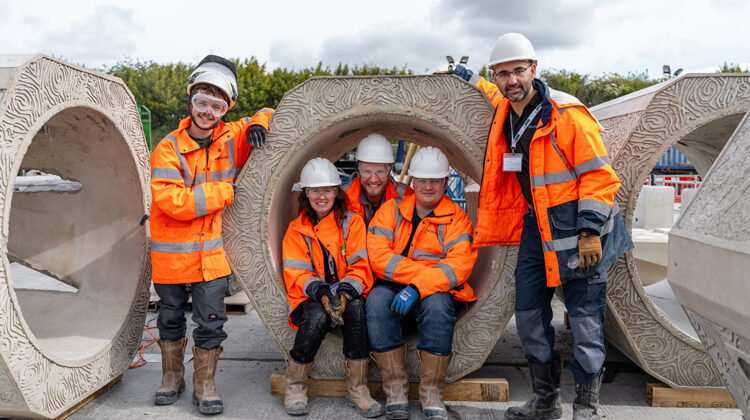
Norwich based company Exo Engineering has designed and produced bespoke artificial reefs aimed at increasing cod numbers in the North Sea.
The past 200 years have seen significant loss of reef habitats in the North Sea, severely affecting marine biodiversity. The North Sea is already a hotspot for offshore wind farms generating renewable energy. In the Netherlands, nature-inclusive design is now an ecological requirement for the development of new offshore wind farms. There’s increasing evidence that this approach could help to restore a balanced healthy ecosystem that will benefit all users, including fishers.
Exo Engineering has designed artificial reefs specifically for these new offshore wind developments and key species in the North Sea. Each reef weighs 4.5 tonnes and features large swim through habitats for juvenile species such as cod, as well as complex surface textures for reef building organisms to become established. The reef design has the potential to create sheltered, sandy environments that could support pioneering, reef-building species.
‘As we begin to see the inclusion of artificial reefs being made mandatory as part of the offshore windfarm tendering process, it represents an opportunity to design bespoke artificial reef units that are geared towards targeting specific species,’ said Exo Engineering’s operations manager Will Melhuish.
Research in collaboration with TotalEnergies in the Netherlands and the Living Windfarms Project aims to quantify the impact that these large artificial reefs has on marine species. The reefs were deployed in late summer in the North and Celtic seas and will be monitored using environmental DNA and remote operated vehicle surveys.
‘We are excited to participate in a pilot project in the Dutch North Sea to facilitate research on these specially designed artificial reefs,’ said environmental engineer Liselotte Van Cranenburgh from TotalEnergies EP Nederland. ‘We look forward to returning next year to assess the biodiversity gains and species settlement. The results of this pilot project can enhance future nature-inclusive design decisions for offshore wind farms and other offshore energy infrastructure in the North Sea and beyond.’
The reefs also represent innovations in low-carbon concrete. ‘These artificial reefs use low-carbon alternatives to cement, as well as recycled aggregates,’ said William Coulet, MD of Exo Engineering. ‘This is so important for reducing emissions and creating a circular economy while also restoring natural habitats and boosting commercial fish stocks.’


